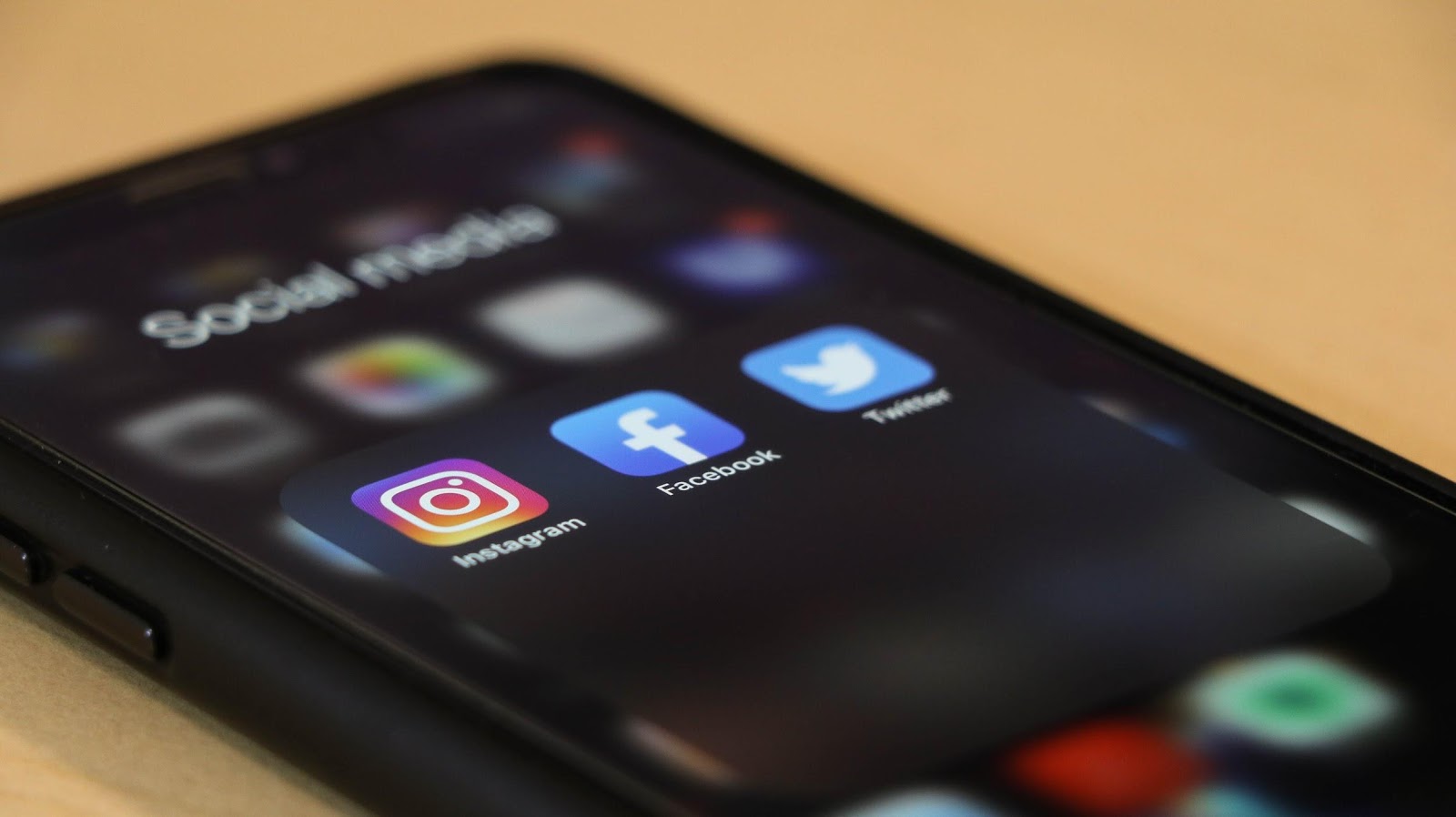
Social media is here to stay. We may as well use it to our advantage.
 Like it or loathe it, social media is an important communication method for success.
Like it or loathe it, social media is an important communication method for success.
Being seen in this industry is challenging. In an uncertain world still reeling from the coronavirus pandemic, there is fierce competition for jobs. The market feels increasingly saturated. How do you stand out? Slight adjustments to the way you market yourself and get your work out there can have a big impact, getting you ahead. Over the past five years, I’ve found that out first hand.
Utilising social media tools has been a game changer. It’s not for everyone, but if you come at this with an open mind, I think you’ll find some of the following advice really useful.
As I write this right now, this is my number one social media platform.
Whoever you want to connect with - somebody working at Panasonic or DJI, the CEO of a well-known travel agency or a cinematographer who you really look up to - they’re here.
I’ve used the platform to grow a solid network of peers and contacts. I can directly message these people and reach out to them. I can find out if they’d like to work together, or shoot them a question. For example, I recently asked for advice about who to insure my filmmaking equipment with. Straight away, I received real-world feedback from my peers who are out there, doing what I do.
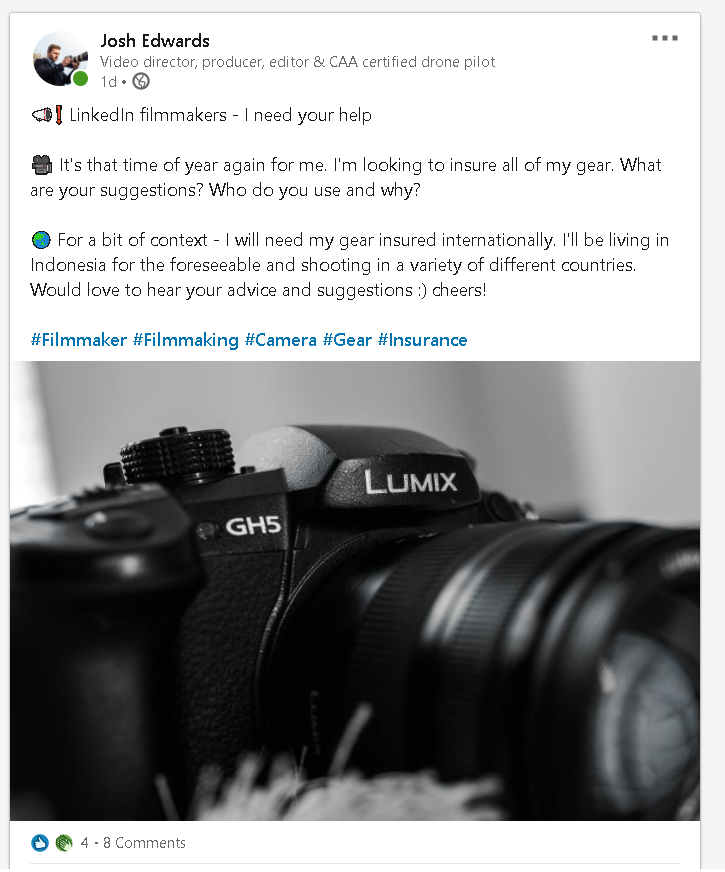
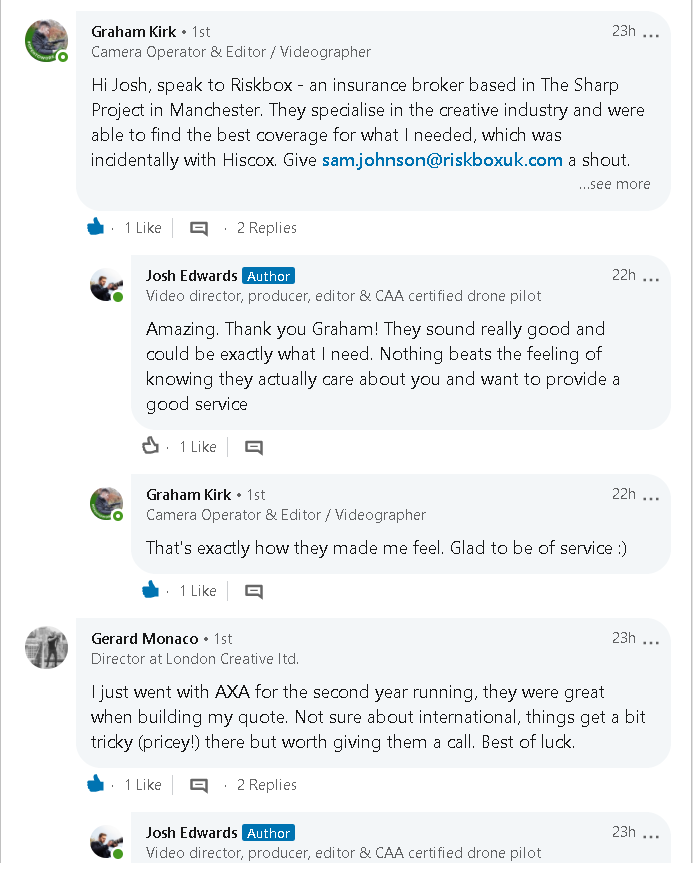
Furthermore, it’s a great platform to share your work. Posting the video of your latest project or behind-the-scenes stills shows that you’re active, in the thick of it. You just never know who is going to see this. I’ve had people reach out to me with jobs just because they saw a video I posted.
Right now, organic reach on LinkedIn is pretty powerful. ‘Organic reach’ is when your post has the ability to reach a lot of people on the platform naturally, without you having to pay. On platforms such as Instagram and Facebook, organic reach is practically dead. They want you to ‘pay to play’.
That’s why LinkedIn is so good right now. My latest video is appearing in a CEO’s feed because somebody we’re mutually connected with commented on it. Then he likes it, and it appears in someone else's feed who previously I had no chance of reaching. On and on it goes. A very useful ripple effect.
Top tip: utilise the ‘featured’ section. If someone is viewing your profile, they can find links to your website, your YouTube channel and all your showreels very quickly. It’s perfect.
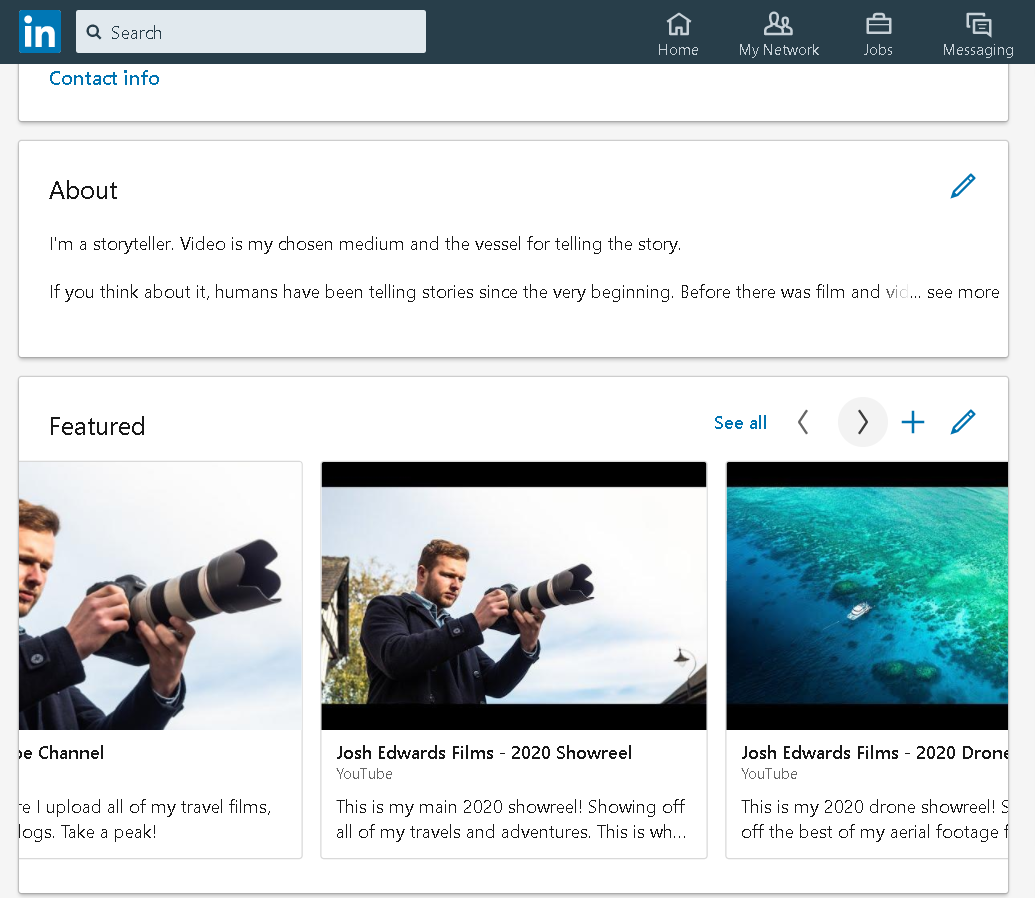
Seemingly everyone uses it. Why wouldn’t you share your work on a platform that has half the world’s attention? I’ve found Instagram to be a great place to show off and promote my latest work in a more personal way.
I can show some of my personality, giving people an idea of who I am in the day-to-day. Instagram is driven by mobile-first content and primarily viewed on phones, so you don’t have to produce something that’s really polished and high-quality.
Whereas LinkedIn is seen as the clean-cut professional platform, on Instagram, people are looking for ‘raw and real’. Make use of Instagram stories by sharing behind-the-scenes clips of your shoot.
What I’ve learnt about business over the years is that at the end of the day, people buy people. You could be the greatest DP in the world but if you’re a bit of a dick about it, people won’t work with you. Instagram may well be the first point of contact between you and someone looking to hire. So, make a good first impression!
Top tip: use the ‘direct message’ tool to reach out to peers. It’s a fantastic way to get in touch and learn something from the best. I particularly like the voice option. If the person you’re contacting receives a lot of messages like yours every day, a personal voice message can help you stand out and grab their attention.
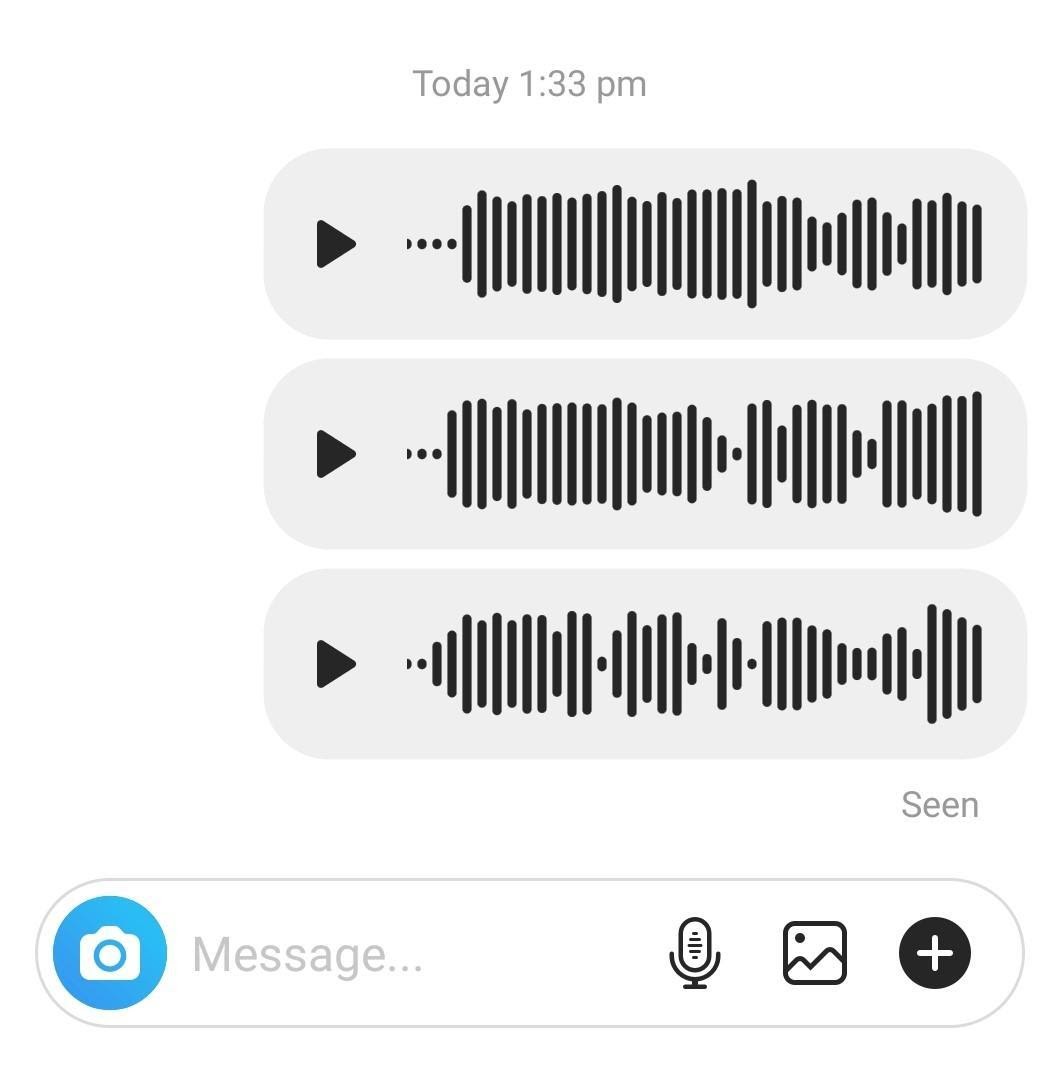
Twitter is where people come to talk (hence the name, Twitter). I’ve found it to be a useful tool if you know who to follow and what to search for. Very quickly, you can find out about the latest industry news and keep up to date with who’s doing what.
For example, if Panasonic releases an update about the Lumix S5, search ‘Panasonic Lumix S5’ and instantly find a wealth of opinions, rumours and debate about this camera. Don’t be afraid to dive into these discussions - get involved with the community. It’s useful to show your face and be part of the debate.
Twitter can also be a surprisingly underrated place to get your work seen. You never know what might gain traction. As an example, in 2019 The Queen Mary 2 was sailing out of Liverpool. I took the time to head down to the river and filmed the drone footage below.
Because this event was popular in my local area and had happened very recently, when I posted the footage on Twitter, it gained a lot of interest. By tagging the right people such as Cunard’s Twitter account, the Liverpool Echo newspaper, the Liverpool tourist board and others, I was able to get eyeballs on my work.
This led to someone offering me drone work, as well as Cunard reaching out to use the piece in their marketing. A real win!
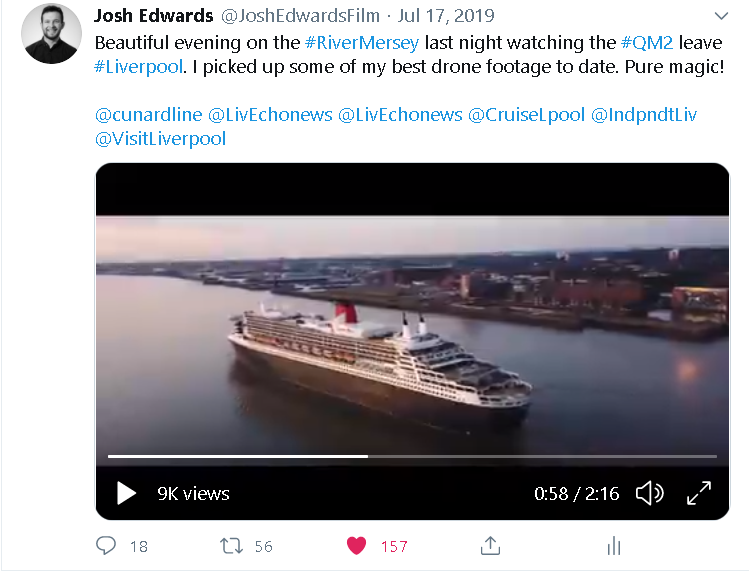
The platform I use least regularly. In general, it’s not as others mentioned above. I’ve found that my Facebook network is based more around family and friends - both past and present. However, it also led to one of my biggest jobs
I made a page for my business and shared work here because you just never know who’s going to see it. After a few months of posting, an old school friend messaged me and brought me in to carry out a large drone project for his family construction business. If he hadn’t seen the work I was sharing on Facebook, he wouldn’t have thought to ask!
Final thoughts
In conclusion, that’s what you want social media for. Get your face seen and known in the right circles. You want to be the first person that comes to mind when people think ‘who’s a good videographer for this job’.
I hope these tips and ideas have helped! If you have any other ideas or use other platforms, we’d love to hear about it in the comments.
Tags: Business

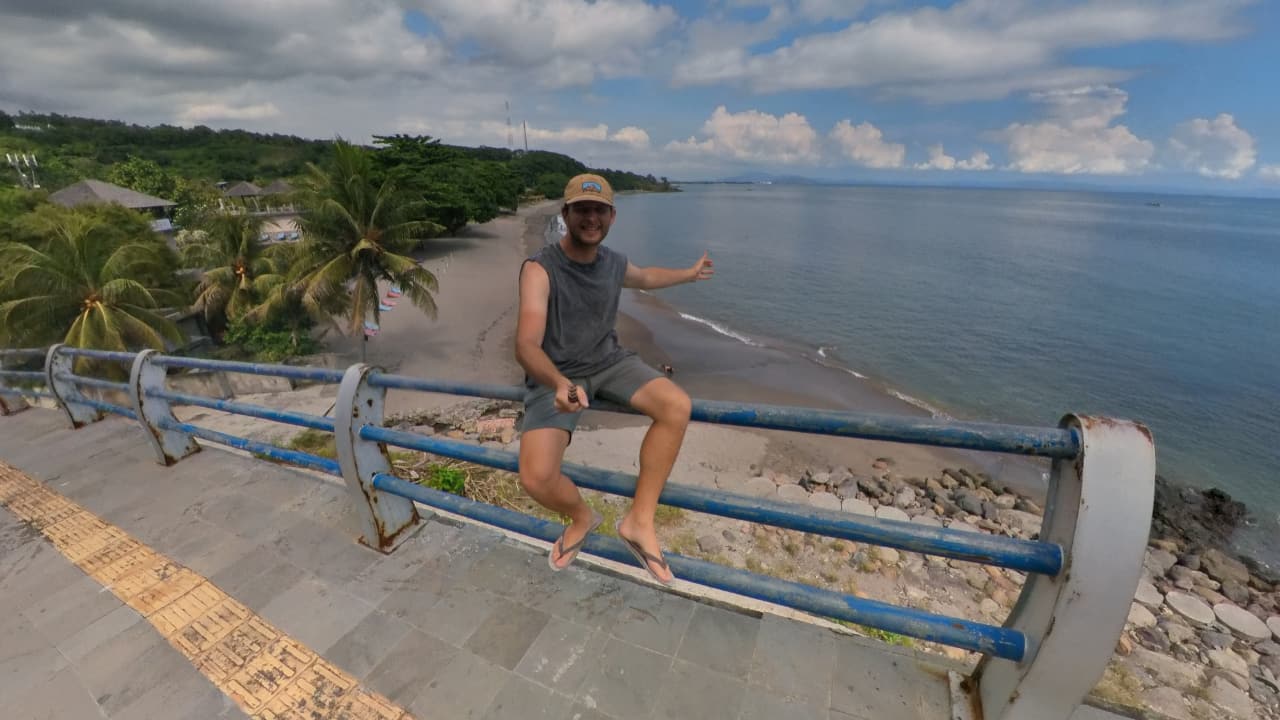
Comments